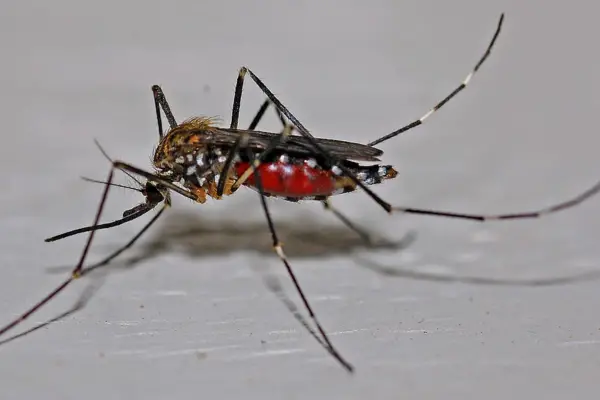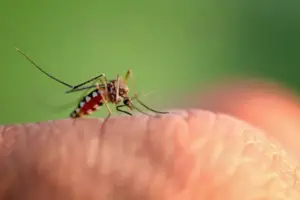Mosquitoes can quickly ruin our outdoor experiences with their irritating presence.
Over time, people have explored various ways to keep these bloodsuckers away.
One widely held belief is that Lysol, a common household disinfectant, can effectively repel mosquitoes.
In this article, we’ll delve into the truth behind this claim and assess the advantages and disadvantages of using Lysol as a mosquito repellent.
The Myth of Lysol as a Mosquito Repellent:

There is a misconception that Lysol’s powerful disinfectant properties can also keep mosquitoes at bay.
Despite some anecdotal evidence and unverified sources supporting this notion, it’s important to note that Lysol was never intended or tested for mosquito repellency.
Related Post: Do Fires Attract Mosquitoes? Answered
Does Lysol Repel Mosquitoes?
No, Lysol does not effectively repel mosquitoes. It was neither designed nor tested for this purpose. While its strong odor might discourage some mosquitoes temporarily, it is not a reliable or long-lasting solution for mosquito control.
For effective protection against mosquito bites, it’s crucial to use scientifically proven repellents like DEET or picaridin-based products.
Pros of Using Lysol as a Mosquito Repellent:
Kills on Contact:
When sprayed directly on mosquitoes, Lysol’s chemicals can be lethal, providing instant relief from buzzing and biting indoors.
Indoor Use:
Lysol can safely be used indoors to eliminate mosquitoes that have found their way inside.
Familiar Product:
Conveniently, many households already have Lysol on hand, allowing for immediate mosquito control without purchasing specialized repellents.
Sanitizing Effect:
Lysol’s effectiveness as a disinfectant helps maintain a cleaner and healthier living environment.
Reduced Mosquito Resting Sites:
Indoor application of Lysol can eliminate potential resting spots for mosquitoes on surfaces.
Cons of Using Lysol as a Mosquito Repellent:
Limited Repellent Properties:
Lysol’s effectiveness as a mosquito repellent is limited, as it was not designed for this purpose.
Health Risks:
If misused or inhaled excessively, Lysol’s chemicals can pose health risks to humans and pets.
Not Suitable for Outdoor Use:
Due to its chemical composition and potential harm to the environment, Lysol is not recommended for outdoor application.
Unverified Claims:
Relying on unverified claims can lead to increased mosquito exposure and potential health risks.
Related Post: 7 Best Essential Oil To Repel Mosquitoes
Effective Mosquito Repellent Alternatives:
Instead of relying on Lysol, consider these proven and safe alternatives:
DEET-based Repellents: DEET is a well-researched and effective mosquito repellent that offers lasting protection.
Picaridin-based Repellents: Picaridin provides reliable mosquito protection without the greasy feel of DEET.
Natural Repellents: Some natural options like citronella oil, lemon eucalyptus oil, and lavender oil have shown promise in repelling mosquitoes.
Tips to Protect Yourself Against Mosquitoes:
- Use EPA registered insect repellents containing DEET, Picaridin, or oil of eucalyptus.
- Treat your clothing with permethrin, which kills mosquitoes on contact without side effects.
- Opt for yellow outdoor lights to reduce mosquito attraction.
- Keep wet disinfectant wipes handy to clean off lactic acid produced during exercise, deterring mosquitoes.
Factors that Attract Mosquitoes:
- Pregnant women exhale more carbon dioxide, attracting mosquitoes.
- Lactic acid produced when sweating attracts mosquitoes.
- People with blood type “O” are more susceptible to mosquito bites.
- Alcohol consumption can raise body temperatures, making one more appealing to mosquitoes.
Conclusion:
While Lysol may serve as a temporary indoor mosquito control measure by killing mosquitoes on contact, it is not an ideal long-term repellent or suitable for outdoor use.
To effectively repel mosquitoes, it’s best to use products explicitly designed and tested for this purpose, such as those containing DEET, picaridin, or essential oils.
Additionally, maintaining a mosquito-free environment involves multiple approaches, including eliminating standing water, using screens on doors and windows, and wearing protective clothing.
If you combine these strategies, you can enjoy your time outdoors without the annoyance of mosquito bites and ensure a safe, mosquito-free experience.
References
- https://pubmed.ncbi.nlm.nih.gov/12083361/
- Landing Preference of Aedes albopictus (Diptera: Culicidae) on Human Skin Among ABO Blood Groups, Secretors or Nonsecretors, and ABH Antigens | Journal of Medical Entomology | Oxford Academic
- Landing Preference of Aedes albopictus (Diptera: Culicidae) on Human Skin Among ABO Blood Groups, Secretors or Nonsecretors, and ABH Antigens | Journal of Medical Entomology | Oxford Academic
- Mosquitoes prefer pregnant women – PMC
- Surprising things that attract mosquitoes and how to protect yourself




